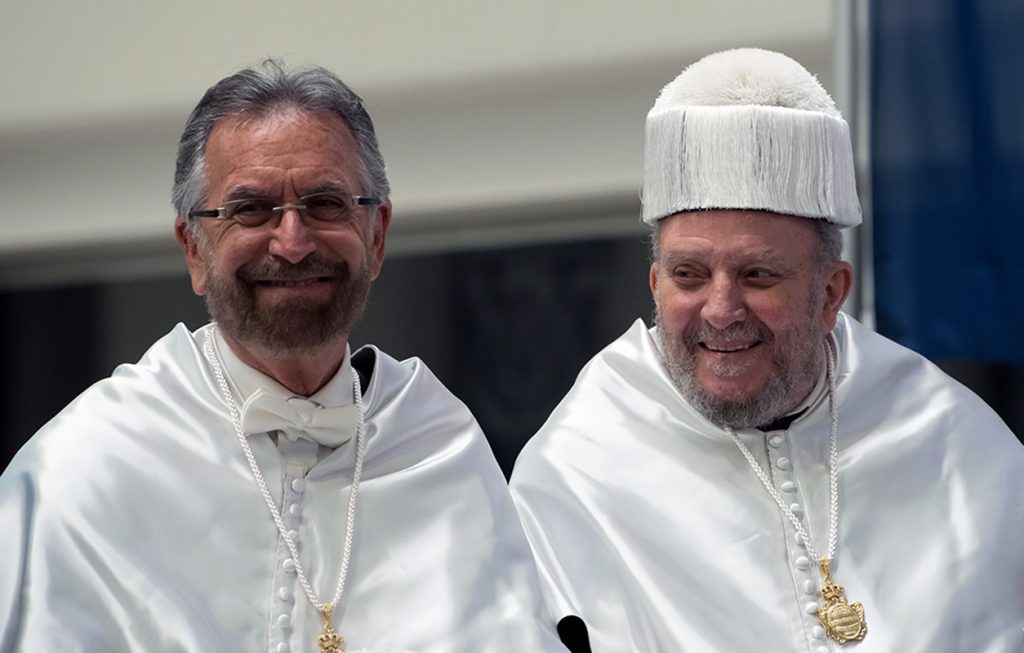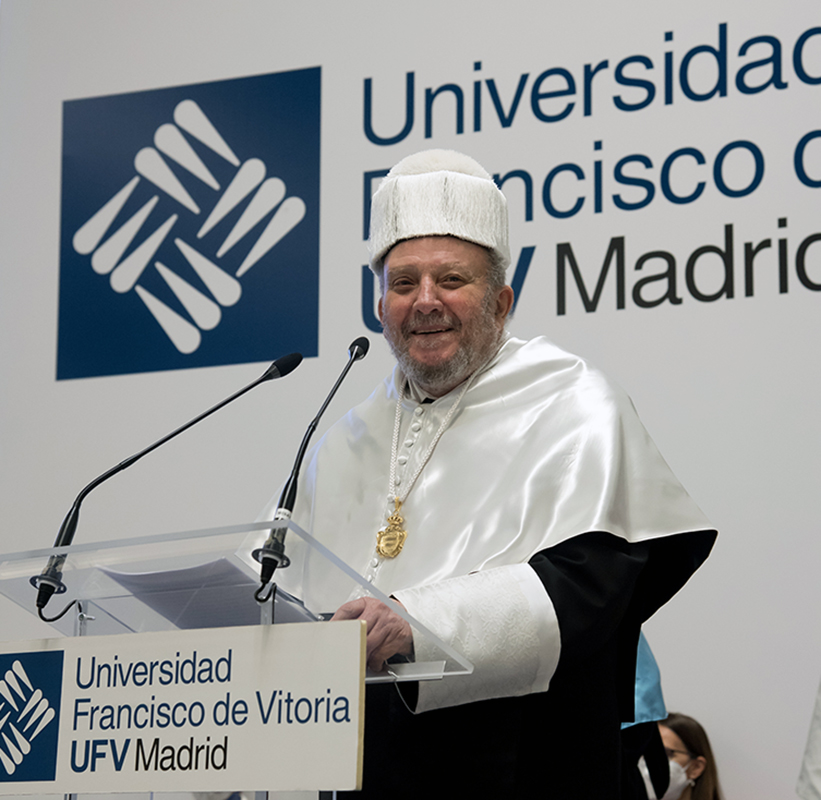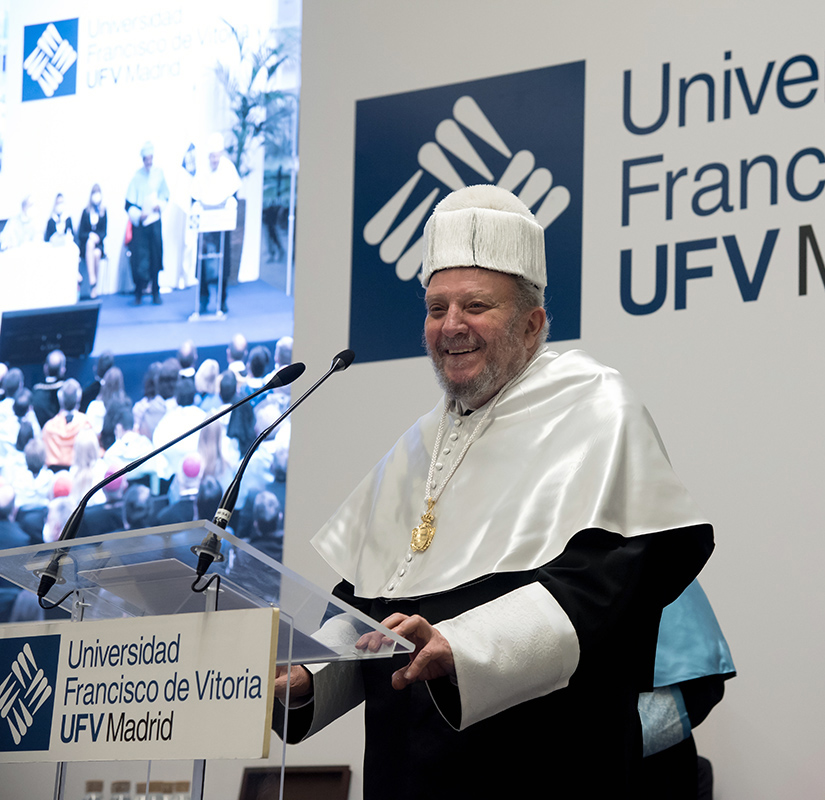Solemne Acto de Investidura como Doctores Honoris Causa de D. Francisco José Gómez de Argüello y del Rabino David Shlomo Rosen from Equipo Audiovisual on Vimeo.

(Universidad Francisco de Vitoria – Madrid)
I thank the Lord and this University for this event, which seals an itinerary of approach and friendship between the Neocatechumenal Way and the Jewish people, that began with the trip of Carmen Hernández during 1963-64, and that was promoted by the declaration Nostra Aetate of the Second Vatican Council in 1965
The rediscovery of the Jewish root of our older brothers and fathers in faith, propitiated by the Constitution Dei Verbum, that affirmed the unity between the Old and New Testament and that the Neocatechumenal Way put into practice for more than 50 years with the weekly celebration of the Word of God, gave birth to love for the Jewish people in the brothers of the Way.
The Lord brought me, through the encounter of the suffering of the innocents and knowing Blessed Charles de Foucauld to live among the poor, believing that if God was going to come back, I wanted to stay at the feet of the crucified Christ with the last ones of the earth, the innocent ones.
Within this context I met Carmen, who had spent a year travelling in the land of Israel, where she had arrived in the summer of 1963. It was an unforgettable trip for her, where Scripture opened up in an impressive way allowing her to understand the unity between the history of salvation and the land where God chose to manifest himself. The visit of Pope S. Paul VI to Nazareth in January 1964, of which she participated, helped her to understand the fundamental keys of the Council, seeing that to go back to the Christian origins and to the Jewish roots were the two fundamental pillars for the renewal of the Church. For this reason, this doctorate should also be awarded to Carmen Hernández.
We met in 1964 after her return from this historical pilgrimage to the Holy Land. I had gone to live in a shack with the poor of Palomeras Altas (Madrid). There Carmen came to know the community of brothers that were meeting in my shack and remained very much touched by the answer they were giving to the word of God. She decided to remain and live with us, and we built a shack near the one I was living in. At the request of these poor we started to announce to them the Gospel. With time, the Lord brought us to discover a theological-catechetical synthesis based on the Word of God, Liturgy and Community, to lead people to fraternal communion and adult faith. God used Carmen and me to create a work of renewal in the church, that does not belong to us: it is a gift of the Holy Spirit.
This new itinerary of Christian initiation, stirred up the interest of the then Archbishop of Madrid, Msgr. Caiemiro Morcillo, whom after visiting me in my shack, was very much touched and encouraged us to bring it to the parishes; for this reason it spread throughout Madrid, throughout more of Spain, and then to thousands of dioceses all over the world. In 2008, the Statute of the Neocatechumenal Way received its final approval from the Holy See.
Once a minister in Israel asked me where this love of the brothers of the Way for the Jewish people was coming from. I think it may be important to explain it here.
We are all like Abraham, who leaves his land without knowing where he is going: God chooses Abraham, makes him a promise and the Word of God makes it fruitful, gives life to history, sets it in motion and Abraham must continue to follow the Lord. This is how we teach our brothers on the Neocatechumenal Way – because we are all children of Abraham – that this is the way of faith: living day by day responding to the events of history, where God manifests himself. The events of history always surprise us!
We are forming adult Christians: “adult Christians” means for us to be Christians in real life. God speaks to us in history, in the events. We try to gradually form the brothers of the communities so that they may be enlightened on this action of God in their history: something very Jewish! We are deeply united with the Jews, they are our parents in faith and we are very grateful to God for them and for the people of Israel.
We have a common battle to wage against the beast, the beast that wanted Auschwitz, that continues to act in the world and that prepares a new attack against the Church and the Jewish people, a terrible attack made of atheism, of denial of God. In this battle, in this historical situation in which we find ourselves, I believe that we must help each other, Christians and Jews, to deepen our ties to do the will of God, to redeem this society, to save the Judeo-Christian family and the transmission of faith to children. For us it is essential to pass faith to our children – we have large families: that is why we have a domestic celebration where the Word of God is proclaimed and parents dialogue with their children.
In this friendly relationship with the Jewish people, the Domus Galilaeae has played a great role. We had never thought of building this international center on the top of the Mount of Beatitudes, in Israel, and that it would become so important for the relationship with the Jews: every year 150,000 Jews pass by this house to visit it. Several seminarians, coming from the various Redemptoris Mater seminaries around the world, learn Hebrew and welcome the Jews, sing Shema, Israel, and show them the house.
There we gather every year many bishops of the Catholic Church who have heard about the Way and want to know what it is. At one of these meetings we invited the bishops of the United States, and about 80 bishops came, with Bishop O’Malley, the Cardinal of Boston. I had started to compose a symphony dedicated to the suffering of the innocent and wanted to offer it as a tribute to the bishops. Also present were Rabbi David Rosen, here present, the Director General of the Israel Ministry of Tourism and various Jewish authorities. Listening to the symphony, Rabbi Rosen was moved and said: “This is our Jewish music, you can see that you really feel what makes us suffer.”
I was very impressed by the Shoah and the suffering of the innocent, as well as the fact that the Blessed Virgin Mary, the Mother of Jesus, upon seeing her dead Son felt that a sword pierced her soul. Thus, the Lord inspired me to compose a symphonic poem in honor of her and all the Jewish mothers who saw their children die in Auschwitz and in the various concentration camps.
After this symphony, the rabbis themselves proposed that we continue that experience of friendship and dialogue with a meeting of a few days at the Domus Galilaeae, through a letter of invitation signed by me, by Rabbis Rosen and Greenberg, and by some cardinals. Two 4-day meetings were held, one in 2015 and the other in 2017, in which several cardinals and bishops were present, as well as more than a hundred rabbis, with their wives, and many leaders of the Way in different parts of the world. As a result of this meeting, 100 Orthodox rabbis signed an important declaration on Christianity entitled: Doing the Will of Our Heavenly Father: Toward a Partnership between Jews and Christians, which states that “the emergence of Christianity in the history of mankind is neither an accident nor a mistake, but the result and the divine gift desired for the nations. “
Next we are going to listen to some fragments of the symphonic-catechetical celebration. The inspiration I had when composing this symphony is that the sword, prophesied by Ezekiel (ch. 21), pierced the soul of the Holy Virgin Mary, so that her suffering would be associated with the universal Redemption of Our Lord Jesus Christ: he made sacred the human suffering, so we must kneel before the suffering of the innocent.
What a mystery is the suffering of so many innocents who carry the sin of others, that unprecedented violence, that line of naked women and children towards the gas chamber, and the deep suffering of one of the guards, who in his heart – wondering what could he do for them- he heard a voice saying to him, “Get undressed and join them in line.” This is a historical fact, this man was called Kurt Gernstein, a Nazi, who had realized what was happening and tells it in his memoirs in which he says: “I do not understand why my reason tells me to put myself with them in the gas chamber, it would just be one more death! ” He was an atheist, but what he felt inside really came from God. Some say that after Auschwitz you can no longer believe in God. If life is truly a horror, there is no God, and God’s silence would prove it! But if in this total darkness a man, out of love, freely undresses, embraces another and enters death with him, then love exists. Where does this love come from? If love exists, then God exists, and suddenly this darkness lights up, a light appears in the horror of the gas chambers: this is what, for example, Saint Maximilian Maria Kolbe and Saint Edith Stein did, and in its fullness it is what Our Lord Jesus Christ did, who became sin for us all (cf. 2 Cor 5,21).
We will listen to a part of the Symphony of the Innocents. As it was not possible to bring the entire orchestra together, for the first time it will played by a string quartet, a piano and a small choir.
The first movement is called Gethsemane; the Lord has inspired me to reflect on the moment in which Jesus Christ cannot take it anymore and God sends him an angel to help him. Then there is the arrival of Judas with the soldiers to arrest him. And at the end, the choir will end this part singing: “Abba, Father!”. The word Abba in Hebrew means dad, as if saying that Jesus Christ has accepted the will of the Father.
The next movement is called “Forgive them,” where we look at Christ who cries from the cross: “Forgive them!” A tenor will sing: “Forgive them!” Christ from the cross has cried out to his Father to forgive us all: “They don’t know what they are doing”, because we were killing God.
Next comes the movement called ‘The sword’. Sword, burnished to kill. The sword that pierces the soul of the Virgin Mary. At the end of this movement, the choir sings “Shema, Israel.”
The last movement is ‘Resurrexit’; the symphony ends with the resurrection of Christ.
Let’s listen. Luciano di Giandomenico from Genoa is the director. All the musicians are from the Neocatechumenal Way.
Kiko Argüello
Madrid, October 25 2021


